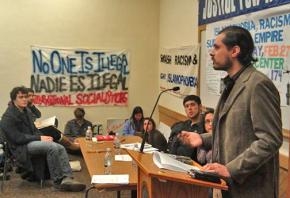Trapped by the security state
Ayyub Abdul-Alim's only crime was refusing to be an FBI informant in the Muslim community. The businessman and father was arrested by Springfield police, in collaboration with the FBI, on a fabricated weapons charge in 2011. After refusing to help law enforcement spy on fellow Muslims, he is still awaiting trial after over two years--and could face 15 years in prison.
reports on a recent meeting at UMass Amherst in support of Ayyub, which also took up the connections between the attack on Muslims and the U.S. government's surveillance state, in an article written for the Peace Walks blog.
MORE THAN 100 people came out on March 6 to take part in a panel discussion titled "Islamophobia, Racism, Surveillance and Empire."
The talk was organized by the UMass Amherst branch of the International Socialist Organization, but boasted an impressive group of student co-sponsors, including the Graduate Employee Organization; Graduate Student Senate; Black Student Union; Latinos Unidos; Center for Multicultural Advancement and Student Success; Social Thought and Political Economy; the Middle Eastern Studies Program; the W.E.B. Du Bois Department of Afro-American Studies; and the recently founded chapter of Students for Justice with Palestine.
The event was the first in a series of two discussions led by renowned authors and scholars Deepa Kumar and Arun Kundnani held at UMass and Hampshire College to further the discussion of Islamophobia and surveillance, and to spread awareness and gain support in the campaign for freedom for local organizer Ayyub Abdul-Alim.
For over two years, Ayyub has sat in Hampden County jail awaiting trial for the crime of refusing to become an informant on the local Muslim community.

Facing trumped-up gun charges that carry a sentence of up to 15 years, Ayyub is awaiting justice. He recently learned that his spouse is currently working as an informant with the local FBI and has received between $12,000 and $100,000.
In late 2013, a group came together under the banner "Justice for Ayyub" to organize around his case and call for his release. The group has organized vigils in front of the courthouse for each of Ayyub's trials, raised funds, and is planning to observe and support Ayyub at the beginning of his trial, which is set for April 10.
DEEPA KUMAR, associate professor of Media Studies and Middle Eastern Studies at Rutgers University and author of the book Islamophobia and the Politics of Empire started off the talk with a short reflection on the state we are now living in, recalling Orwell's dystopian classic 1984 that describes a future of constant surveillance, obedience and endless war:
“George Orwell could not have imagined the extent of the surveillance state we have today. It is not only cameras and TVs that monitor us, but a whole host of other means that are used by the current surveillance state.“
Kumar traced the development of the “terrorist threat” from the 1970s to the present. She cited the beginning of this transformation following the hostage situation at the 1972 Munich Olympics, where the labeling of rogue militants changed from simply “hijackers” or “rebels” into the blanket term of “terrorists.” She argued that the terrorist was racialized in the 1980s and '90s, when Arabs and Muslims came to be seen as the face of terrorism."
She shared powerful statistics: "In America, you are twice as likely to be struck dead by lightning than killed in a terrorist attack." She continued, "45,000 people a year die from lack of access to health care in this country."
New York University professor and author Arun Kundnani spoke next on more individual cases of how the war on terror and classification of "terrorist" have affected communities.
For his recently published book, The Muslims are Coming! Islamophobia, Extremism and the Domestic War on Terror, Arun interviewed dozens of activists, organizers, FBI agents and police officers to understand better the effects of the global war on terror.
One striking story Arun shared was the story of Abdullah Luqman, a veteran and Black imam from Detroit.
Abdullah Luqman converted to Islam while he was in prison, influenced by the work of Jamil Al-Amin (otherwise known as H. Rap Brown, chairman of the Student Non-Violence Coordinating Committee and Black Panther organizer in the late '60s).
On October 28, 2009, following a prolonged investigation and the use of informants, Imam Luqman was shot and killed. Autopsies reveal that he was shot more than 21 times.
Both speakers had insightful and moving analyses on the current surveillance state and very clearly broke down this myth of the "terrorist threat."
When the United States government is spending over $700 billion on the military every year and people in this country are starving, there is a problem.
Rather than spending millions on "national security," the infiltration of communities and drone attacks on innocent children and civilians in Pakistan, the U.S. government should focus its energies on opening schools, creating better access to health care and housing, and bringing jobs into this country.
Here in Massachusetts, defense contractor Raytheon is the largest employer. Why are we paying people to fund and funnel endless war?
And when are we going to stop it?
As Deepa reminded us, "We are the 99 Percent. They are the 1 Percent. We are the many, and they are the few."
We know what's happening. Now the question is, what are we going to do about it?
First published at the Peace Walks blog.


